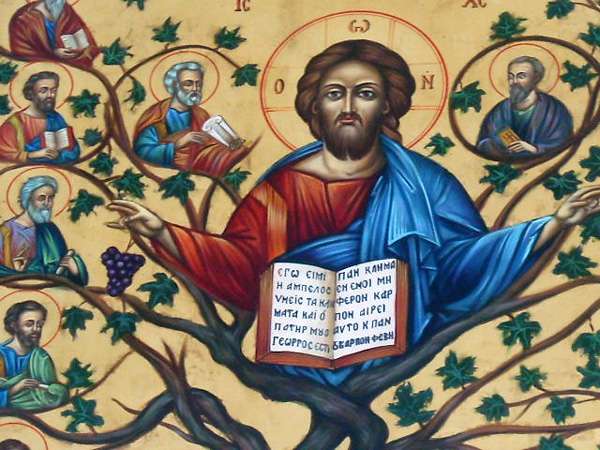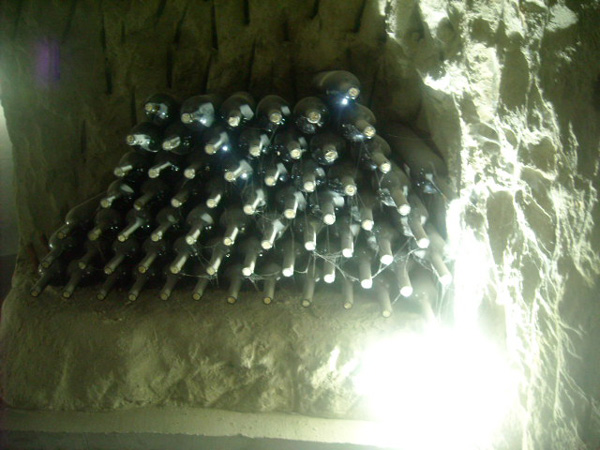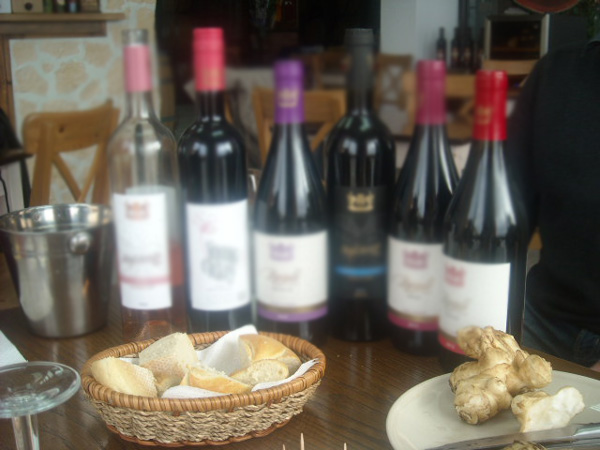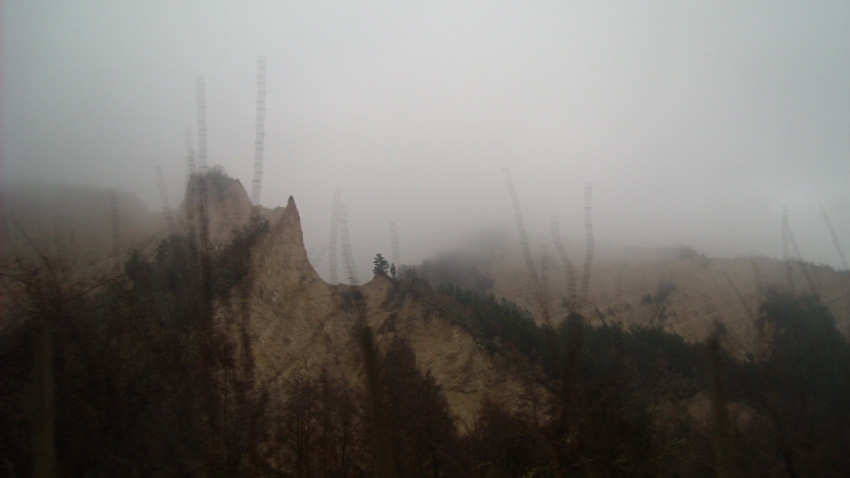About 15 years ago Kolio bought 30 ha of deserted old vineyards and planted them with all possible grape varieties that could grow in one of Bulgaria's southernmost towns, Melnik. This was an unconventional approach for a region where wine was typically made from a single grape variety, the local and unique Shiroka Melnishka (Broad-Leafed Melnik Vine). It took Kolio ten years to travel the way from planting the new vines to the first good wine worthy of a competition.
After the first medals Kolio decided that the moment had come to open his own winery. He won European financing and a year later the chateau was already a fact. Found in close proximity to the vineyards, it can offer almost all that one could dream of: a breath-taking vista to a few mountains, state-of-the-art winemaking equipment … and a helipad, as well as a ramp.
 From time to time Kolio cracks a joke or two to enliven our otherwise serious exchange. Near the place where freshly picked grapes are put into the mill, one can see an icon.
From time to time Kolio cracks a joke or two to enliven our otherwise serious exchange. Near the place where freshly picked grapes are put into the mill, one can see an icon.
"Jesus Christ - the True Vine. I decided it was better to become God's colleague, because I was God-inspired to plant a vineyard”, Kolio smiles. “The land was deserted and I had to do my own selection of grape varieties - ten red and six white ones, Broad-Leafed Melnik, the Early Melnik or Melnik 55, 1300 Melnik, Syrah, Merlot, Cabernet, Pinot Noir, Sangiovese, Sauvignon Blanc, Chardonnay, Viognier, Sandanski Misket and Keracuda. Most of the wines are varietal but we are also venturing into the art of blends.”
 We go down to the wine-cellar where wooden barrels are not in the expected large quantity and racks for aging in bottles are not many either. True, the wine-cellar is young, but there is hopefully something hidden from older vintages. A narrow corridor takes us to small tunnels carved into limestone rocks - the so-called mels that Melnik is named after.
We go down to the wine-cellar where wooden barrels are not in the expected large quantity and racks for aging in bottles are not many either. True, the wine-cellar is young, but there is hopefully something hidden from older vintages. A narrow corridor takes us to small tunnels carved into limestone rocks - the so-called mels that Melnik is named after.
"This has been the bottom of a lake and you can see the limestone layers turned smoky perhaps by the eruption of a nearby volcano. One day we might be able to age wine using the Champagne technology.”
 This is the right moment to hear some family stories and recipes inherited from ancestors. Quite disappointingly, Kolio's story is fairly prosaic. No wine cellars were found in the villages around Melnik and today within a radius of 15 km there are ten wineries, eight of them new ones.
This is the right moment to hear some family stories and recipes inherited from ancestors. Quite disappointingly, Kolio's story is fairly prosaic. No wine cellars were found in the villages around Melnik and today within a radius of 15 km there are ten wineries, eight of them new ones.
"Locals were allowed to have small vineyards, up to 0.1 ha and they would make up to half a ton of wine. The glory of this region was in the 19 c. The winemakers of that time were Greek merchants. The wine was the property of the ones who sold it, not of the ones who were taking care of vineyards. After the Greek community left Melnik, we lost markets, trade contacts and skills.”
Tasting is about to begin, and the start of course is with younger white and light wines followed by blends and Rose. We hope to be fit for the red ones - the region's pride. It turns out that a Rose, a bit peach-coloured, is made from a local red variety and successfully vies with the harmonious Viognier and Chardonnay that leave - just like the rare Viognier / Syrah blend - a lasting impression in our emotional memory.
Kolio's wife is proud of the winery's lady oenologist who has been trained in Bordeaux.
"Rose wines have no traditions whatsoever, but today given the brisk exchange of information and knowledge the things not inherited by older generations are learned at university. Then come internships, and we end up needing a shorter time to become skilled and do things well.”
What about the success of new wine trends? Is it more common where traditions are not available? A prelude to the reply is a sip of a wild young wine:
"Our fermentation is the classical type and it lacks the specifics of Beaujolais Nouveau - it is simply that grapes ripen earlier and the wine is ready like the Beaujolais. After tasting it many people say - I won't ever drink Beaujolais again.”
Discovering and evaluating differences is both a vocation in the philosophy of wine, as well as sharing it.
"I am not an expert: I wanted to work with Bulgarian and international modern varieties. I did not know what the best quality meant, so I was preparing to experiment, during my first 50 years in the trade.”
Medals from competitions are one thing, but a word from a French colleague is a different story:
What are you going to do now that you have made such good wines at the very start?
Kolio's answer:
"Most answers to the questions about wine ageing and improvement are hidden in time. I invite you let's say 20 or 30 years from now to come and taste our champagnised wines from Broad-Leafed Melnik and Pinot Noir.”

English Daniela Konstantinova
Photos: Ludmil FotevVeliko Tarnovo is hosting the Urban Wine Fest, organised by the Bulgarian Association of Wine Professionals. "October is the month of Bulgarian wine and the richness of our local grape varieties," said Daniel Dragoshinov, a member of the association, as..
October 17, 2025 will go down in history as the date on which the Minister of Culture of Hungary presented the document with which the Tradition of Bulgarian Gardening in Hungary officially entered the UNESCO National Register of..
The center of Bulgaria's town of Asenovgrad is today turning into a colorful scene of flavors, aromas and traditions, in which the spirit of the Red Wall Biosphere Park comes to life , reports BNR's Radio Plovdiv. At the “Festival of Crafts and..
October 17, 2025 will go down in history as the date on which the Minister of Culture of Hungary presented the document with which the..
The center of Bulgaria's town of Asenovgrad is today turning into a colorful scene of flavors, aromas and traditions, in which the spirit of the Red Wall..
Veliko Tarnovo is hosting the Urban Wine Fest, organised by the Bulgarian Association of Wine Professionals. "October is the month of Bulgarian wine and..

+359 2 9336 661
